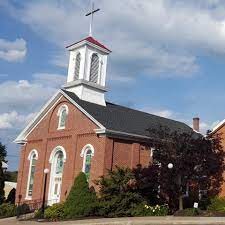Orthodox Presbyterian Church

Introduction
The Orthodox Presbyterian Church was created by the conservative Presbyterians who tried to preserve Calvinism within the Presbyterian structure and avoid the modernist theology. The leader of the conservative Presbyterian was J Gresham Machen who was one of the founders of the Westminster Theological Seminary.
The name Presbyterian comes from the Greek word meaning elder. The Orthodox Presbyterian Church follows the biblical pattern for church government. The elders work along with the pastors to car of the welfare of the members. They believe themselves to be followers of what the Bible says and put it into practice. They are a denomination that confesses the Bible to be the Word of God, and the authority for their faith and life.
Elders must follow the qualifications in the Bible to be ordained for the Eldership. Elders are ordained for life once they are installed and elected by the congregations to their office. The ministers of the Orthodox Presbyterian Church are licensed and ordained and are called by congregations. Deacons of the congregations are also elected by the congregations to supervise their ministries of mercy. Deacons are also ordained but they do not have a spiritual role. All officers of the Orthodox Presbyterian Church must be men.
The Orthodox Presbyterian Church is a member of the North American Presbyterian and Reformed Council. They support a mission work for both at home and abroad. The Orthodox Presbyterian Church promotes the Reformed faith around the world and has participated in ecumenical discussions with other Bible Reformed Churches to perfect the unity that they believe Christ desires for His people.
The doctrine of Calvinism is the most important doctrine of their Reformed faith. John Calvin came out of the Reformation teaching the doctrine of predestination and the Bible as inspired by God; these are all doctrines set forth in the Westminster Confession of Faith and in their Catechism.
The constitution of the Orthodox Presbyterian Church is made up of its Standards of Doctrine, the Book of Discipline, the Confession of Faith, their Catechisms and the Public Worship of God. The Orthodox Presbyterian Church follows the Apostles’ Creed, the Nicene Creed and the Westminster confession of Faith and Catechisms. Their constitution is not the final authority for the Orthodox Presbyterian Church that remain in the direction of the Scriptures of the Old and the New Testaments. The Scriptures are the rule of their faith and the course of their lives.
History
The Orthodox Presbyterian Church had a small remnant of faithful believers who held on to the truth of The Bible during the middle Ages. They avoided the ritualism, ignorance and hierarch whom they believe was led by the Pope of the Church at Rome. Those who followed the Protestant Reformation in the sixteenth century insisted on the infallible authority of Scripture and were not impeded by church tradition or unbiblical doctrines. They believe salvation is a gracious gift from God that is received by grace and faith alone in Christ and not by any priestly rituals or by any amount of good works. They rejected reformed Arminianism and embraced Calvinism. These are the supporters of today’s Orthodox Presbyterians. The Orthodox Presbyterian Church was against Dispensationalism which came in the 19th century in England.
The greatest schism for the Orthodox Presbyterian Church came in the 20th century and was between the theological liberalism also called modernism and the Bible believing faith. They reject the Charismatic movement who believe the gifts of speaking in tongues, miraculous healings, and prophesying is still continuing in today’s churches. They believe the special gifts of the Holy Spirit ended at the end of the Apostolic Ages.
The Orthodox Presbyterian Church is made up of immigrants to America from Scotland, Ireland and England. The Presbyterian Church in the USA split along geographical lines during the Civil War. The Orthodox Presbyterian Church came out of the Northern Presbyterian Church. J. Gresham Machen (born in 1881 and died in 1937) was a professor at Princeton Theological Seminary and was a New Testament scholar. It was in 1929 Princeton Theological Seminary started hiring more liberal professors who favored modernism and liberalism. Because Machen objected to the changes he formed the Westminster Theological Seminary. Machen argued his disagreement before the General Assembly of the Presbyterian Church USA who refuses to take action. Machen and other professors and followers formed the Independent Board of Presbyterian Foreign Missions. The General Assembly condemned the action of Machen and they were fired from their positions and thrown out of the denomination in 1934.
The conservative ministers, elders and laymen led by Machen met June 11, 1936, in Philadelphia to form the Presbyterian Church of America. The Presbyterian Church USA filed a law suit against the newly formed denomination because of their choice of name and in 1939 they renamed the denomination to the Orthodox Presbyterian Church.
There was a schism that formed in 1937 between those wanting the Reformed Tradition and those wanting the Fundamentalist Movement. Those desiring the fundamentalist movement preached premillennialism (the belief that Jesus Christ will return to earth for the Last Judgment just before the one-thousand-year reign of peace) a total abstinence from all forms of alcohol, opposing the ecumenical movement and followed the leader Carl McIntire and formed the Bible Presbyterian Church.
It was in 1970 when two of the largest conservative Reformed Presbyterian Churches merged together the Presbyterian Church in America and the Orthodox Presbyterian Church.
Belief
The Orthodox Presbyterian Church believes the Bible is the inspired Word of God and is without error. They believe the bible is the only source of revelation for the church today.
The Orthodox Presbyterian Church believes the one true God is personal, and an invisible spirit completely self-sufficient and not bound by space or time. They believe God is perfectly holy and just and loving and merciful. They believe in the unity of the Godhead where there are three persons in the form of the Father, the Son and the Holy Spirit.
The Orthodox Presbyterian Church believe God created the heavens and the earth. They believe God governs them in accordance with His eternal will.
The Orthodox Presbyterian Church believes sin came from Adam, the first man, and all mankind is corrupt by nature and dead in sin making them subject to the wrath of God. They believe God has given a covenant of grace so sinners may receive forgiveness and eternal life through faith in Jesus Christ. They believe faith in Jesus Christ is the only way of salvation, and is testified to in both the Old and New Testament.
The Orthodox Presbyterian Church believe Jesus is the Son of God who took upon Himself a human nature in the womb of the Virgin Mary. They believe Jesus Christ lived a sinless life and died on a cross, bearing the sins of and received the wrath of God for, all who trust in Him for salvation, they consider these the chosen ones. They believe Jesus rose from the dead and ascended into heaven, where He sits as Lord and ruler over His kingdom which is the church. They believe Jesus will return to judge the living and the dead and will bring His people with glorious resurrected bodies into eternal life. They believe Jesus will deliver the wicked to eternal punishment.
The Orthodox Presbyterian Church believe there are those whom God has predestined unto life and drawn to Christ by the workings of the Holy Spirit as they hear the gospel. They believe when they believe in Jesus Christ, God declares them righteous or justifies them. They believe God pardons their sins and accepts them as righteous because they have the imputing of the merits of Christ in them. They believe those that are predestined are adopted as the children of God and have the indwelling by the Holy Spirit.
The Orthodox Presbyterian Church believe the Holy Spirit sanctifies, enables the predestined to stop sinning. They believe the Holy Spirit
The Orthodox Presbyterian Church believes all believer strive to keep the moral law of God and the Ten Commandments because they love Jesus Christ their Savior and wants to obey God.
The Orthodox Presbyterian Church believe Jesus Christ established His church to gather and perfect His people by the ministry of the Word, the sacraments of baptism and the Lord’s Supper
The Orthodox Presbyterian Church believes the church is the body of Christ and He is its head. The Orthodox Presbyterian Church believes they are the faithful branch of the true church and acknowledges that Jesus Christ is the only head and the words of Jesus is the final authority in all matters pertaining to faith and life.
The Orthodox Presbyterian Church believes Baptism is to be administered to the children of believers. The Orthodox Presbyterian Church believes the Lord’s Supper is where the body and blood of Christ are spiritually present to the faith of believers.
The Orthodox Presbyterian Church believe Christians have the freedom to consume alcoholic beverages since Scripture does not prohibit the use of alcoholic beverages in moderate uses. They do believe drunkenness is a serious sin and the Scripture does condemn drunkenness.
The Orthodox Presbyterian Church does not believe in liberalism and believes they should not replace the authority of the Scripture with the teachings with modernism. They refuse to accommodate or believe in the liberal ideas and values such as the theory of biological evolution, self indulgent, the criticizing of the Bible teachings, or the liberal perception of equal opportunities for women in the church. They are against dispensationalism.
Cite Article Source
MLA Style Citation:
Holstein, Joanne “Orthodox Presbyterian Church:.” Becker Bible Studies Library Jan 2006.<https://guidedbiblestudies.com/?p=2793,>.
APA Style Citation:
Holstein, Joanne (2006, January) “Orthodox Presbyterian Church:.” Becker Bible Studies Library. Retrieved from https://guidedbiblestudies.com/?p=2793,.
Chicago Style Citation:
Holstein, Joanne (2006) “Orthodox Presbyterian Church:.” Becker Bible Studies Library (January), https://guidedbiblestudies.com/?p=2793, (accessed).

